Description in Spanish: Es el cumpleaños del San Pedrito y todos en el bosque se ponen de acuerdo para organizarle una fiesta. La alegría se siente en todas las ramas de los árboles; hay música y comida. Pero llega el guaraguao y trata de arruinarlo todo. Sin embargo, la fiesta sigue porque el valiente pitirre le hace frente a este imponente pájaro y logra salvar la velada.
Age
Catalog sorted by age group
Cuando Era Puertorriqueña
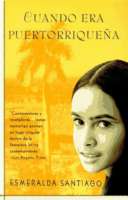
Magia, tensión sexual, comedia e intenso drama se mueven dentro de ésta encantadora pero a la vez dura autobiografía; es la historia de una niña que deja a su pueblo en Puerto Rico por la atracción de Nueva York, y una oportunidad para el éxito. “Clara, calladamente poderosa y muy lírica: una historia de verdadera valentía.” – Kirkus Reviews
The Meaning Of Consuelo: A Novel
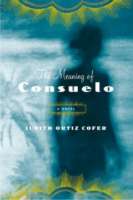
La nina seria, the serious child. That’s how Consuelo’s mother has cast her pensive, book-loving daughter, while Consuelo’s younger sister Mili, is seen as vivacious–a ray of tropical sunshine. Two daughters: one dark, one light; one to offer comfort and consolation, the other to charm and delight. But something is not right in this Puerto Rican family. Set in the 1950s, a time when American influence is diluting Puerto Rico’s rich island culture, Consuelo watches her own family’s downward spiral. It is Consuelo who notices as her beautiful sister Mili’s vivaciousness turns into mysterious bouts of hysteria and her playful invented language shift into an incomprehensible and chilling “language of birds.” Ultimately Consuelo must choose: Will she fulfill the expectations of her family–offering consolation as their tragedy unfolds? Or will she risk becoming la fulana, the outsider, like the harlequin figure of her neighbor, Mario/Maria Sereno, who flaunts his tight red pedal pushers and empty brassiere as he refuses the traditional macho role of his culture. This affecting novel is a lively celebration of Puerto Rico as well as an archetypal story of loss, the loss each of us experiences on our journey from the island of childhood to the uncharted territory of adulthood.
Americas Award For Children’s And Young Adult Literature. Winner
The Firefly Letters
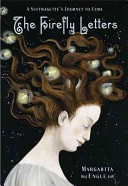
A stunning novel in verse by a Newbery Honor-winning author paints a portrait of early women’s right pioneer Frederika Bremer and the journey to Cuba that transformed her life.
See the review at WOW Review, Volume 3, Issue 1
The Twins and the Bird of Darkness: A Hero Tale from the Caribbean
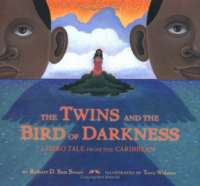
When a benevolent king and his daughter, Princess Marie, find their peaceful kingdom threatened by an enormous, evil, seven-headed bird, the brave princess offers herself as the bird’s hostage in order to prevent the entire kingdom from being thrust into eternal darkness. As soon as Soliday, a kindhearted, hardworking, and generous youth hears about the princess’s sacrifice, he vows to kill the Bird of Darkness and save Marie. His identical twin brother — the jealous, lazy, and dishonest Salacotta — accompanies Soliday on the dangerous journey, but doesn’t lift a finger in order to rescue the princess or slay the monstrous bird. And the second Salacotta sees his chance to claim that he was the one who freed the princess, he does just that. Will Soliday be able to convince everyone that he is indeed who he says? Will his brother admit his treachery? Will Soliday ever be able to trust his twin again? This timeless and resonant folktale about the forces of good and evil and the redemptive power of brotherly love is the perfect story for the ages.
Morning Girl

Morning Girl, who loves the day, and her younger brother Star Boy, who loves the night, take turns describing their life on an island in pre-Columbian America; in Morning Girl’s last narrative, she witnesses the arrival of the first Europeans to her world.
Coquí
El solo nombre Coquí evoca la dulce melodía de la ranita que tiene su hábitat en Puerto Rico. Libro hermosamente ilustrado que nos trae el canto nocturno del coquí y la melodía de reinitas, zorzales, gorriones, y ruiseñores, además del batir de alas de mariposas, acrobacias de lagartijos, un arcoiris, una rana con zapatos, un caballito de trapo y unos maizales que, en la imaginación de la autora, se convierten en niñitas con cabellos color de azafrán. Un desfile de ricas imágenes como sólo ésta sabe traer. Libro para enseñar a los pequeños y a los no tan pequeños el amor por la naturaleza y el vivir en armonía con ésta.
Cuba 15 (Readers Circle)
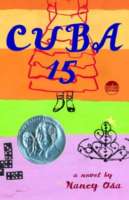
Violet Paz has just turned 15, a pivotal birthday in the eyes of her Cuban grandmother. Fifteen is the age when a girl enters womanhood, traditionally celebrating the occasion with a quinceañero. But while Violet is half Cuban, she’s also half Polish, and more importantly, she feels 100% American. Except for her zany family’s passion for playing dominoes, smoking cigars, and dancing to Latin music, Violet knows little about Cuban culture, nada about quinces, and only tidbits about the history of Cuba. So when Violet begrudgingly accepts Abuela’s plans for a quinceañero–and as she begins to ask questions about her Cuban roots–cultures and feelings collide. The mere mention of Cuba and Fidel Castro elicits her grandparents’sadness and her father’s anger. Only Violet’s aunt Luz remains open-minded. With so many divergent views, it’s not easy to know what to believe. All Violet knows is that she’s got to form her own opinions, even if this jolts her family into unwanted confrontations. After all, a quince girl is supposed to embrace responsibility–and to Violet that includes understanding the Cuban heritage that binds her to a homeland she’s never seen. This is Nancy Osa’s first novel.
From the Hardcover edition.
The Nutmeg Princess
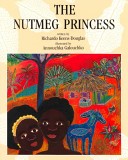
In the Isle of Spice in the Caribbean lived a Nutmeg Princess, called that because she would only appear when the nutmeg was ready for picking, and the sweet smell of spice was in the air, and only those who were unselfish could see her.
La Cucarachita Martina
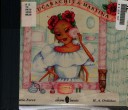
A retelling of the folktale about the criollo cockroach who has many suitors but choses the gentlemanly mouse unaware of his weakness for food. At dinnertime during their first day of marriage, he cannot wait for the meal to be served and jumps into the boiling pot, subsequently dying.
